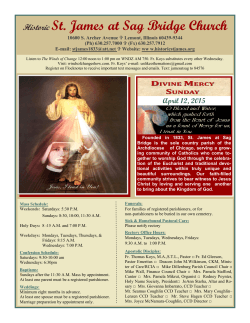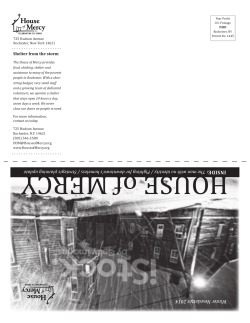
The Feast of Divine Mercy
DIVINE MERCY SUNDAY On this Octave Day of Easter, the Gospel describes the institution of the Sacrament of Reconciliation which Christ conferred on the Apostles (and their successors): ‘he breathed on them and said to them, “Receive the Holy Spirit. Whose sins you forgive are forgiven them, and whose sins you retain are retained.”’ On April 30, 2000, the Second Sunday of Easter was re-named by Pope John Paul II as Divine Mercy Sunday. He did this during the canonization Mass for Faustina Kowalska, a polish nun to whom God had revealed numerous messages concerning His desire to bestow His mercy upon mankind as the last hope of salvation. Old Testament: Two words are used to express God’s mercy and love: hesed and rahămîm. In reference to mercy, God’s hesed is a gift and not a right; ‘it entails a relationship between God and the one who receives it, who is expected to reciprocate by loving God.’i Rahămîm ‘denotes the kind of love and compassion expressed by a mother for her child (Is. 49:15).’ii … Once again, this love and compassion is unmerited; it is freely given by God. We cannot say that we deserve or earn God’s mercy. Page 1 of 4 New Testament: Jesus is the very incarnation of God’s mercy. He made it clear that He desired mercy and not sacrifice. He called sinners, not the righteous. His parable of the Prodigal Son tells us two important things about God’s mercy: to receive mercy from God we must admit our own sins. It is the one who fears God and turns from sin who opens himself up to the gift of divine mercy. the love of God does not abide in an unmerciful heart. The mercy of God cannot penetrate into our hearts if we fail to forgive those who have trespassed against us. On this Divine Mercy Sunday, this Feast of Divine Mercy, we are invited to ponder the loving mercy of God in a special way as it has been revealed to St Faustina. In her diary we read, among many other things, mention of God’s mercy: ‘Proclaim that mercy is the greatest attribute of God. All the works of My hands are crowned with mercy.’ (301) ‘I cannot punish even the greatest sinner if he makes an appeal to My compassion.’ (1146) ‘Before I come as a just Judge, I first open wide the door of My mercy. He who refuses to pass through the door of my mercy must pass through the door of My justice.’ Page 2 of 4 (1146) Concerning our own wretchedness: ‘Your misery has disappeared in the depths of My mercy. … You will give me pleasure if you hand over to Me all your troubles. I shall heap upon you the treasures of My grace. … Come close to My wounds and draw from the Fountain of Life. … Look at the splendors of My mercy and do not fear the enemies of your salvation. Glorify My mercy.’ (1485) Concerning the Sacrament of Reconciliation: ‘Every time you go to confession, immerse yourself entirely in My mercy, with great trust, so that I may pour the bounty of My grace upon your soul. When you approach the confessional, know this, that I Myself am waiting for you. I am only hidden by the priest, but I Myself act in your soul.’ (1602) Concerning the recitation of the Chaplet of Divine Mercy: ‘Say unceasingly the chaplet that I have taught you. Whoever will recite it will receive great mercy at the hour of death. Priests will recommend it to sinners as their last hope of salvation. Even if there were a sinner most hardened, if he were to recite this chaplet only once, he would receive grace from My infinite mercy.’ (687) ‘The souls that say this chaplet will be embraced by My mercy during their lifetime and especially at the hour of their death.’ (754) Page 3 of 4 Concerning Divine Mercy Sunday: ‘I desire that the Feast of Mercy be a refuge and shelter for all souls, and especially for poor sinners. On that day the very depths of My tender mercy are open. … The soul that will go to Confession and receive Holy Communion shall obtain complete forgiveness of sins and punishment. On that day all the divine floodgates through which graces flow are opened. Let no soul fear to draw near to Me, even though its sins be as scarlet. My mercy is so great that no mind, be it of man or an angel, will be able to fathom it throughout all eternity. (699) Living Divine Mercy ‘I am giving you three ways of exercising mercy toward your neighbor: the first ― by deed, the second ― by word, the third ― by prayer.’ (742) ‘The first Sunday after Easter is the Feast of Mercy, but there must also be acts of mercy, … because even the strongest faith is of no avail without works.’ (742) Jesus, I trust in You! i ii Scott Hahn, 2009, Catholic Bible Dictionary, Doubleday, NY, p. 601 Ibid, p. 602 Page 4 of 4
© Copyright 2025









